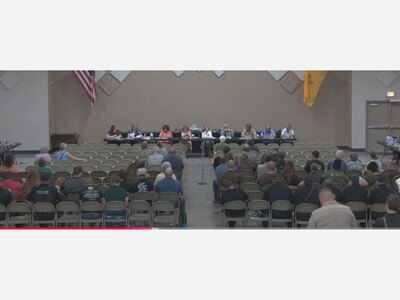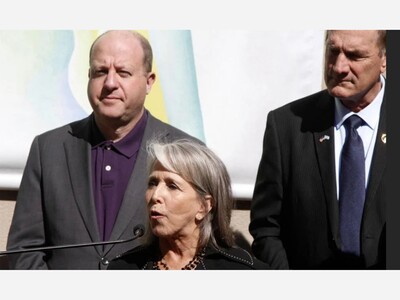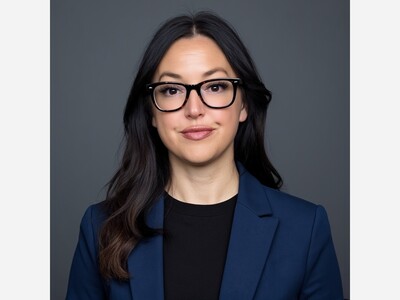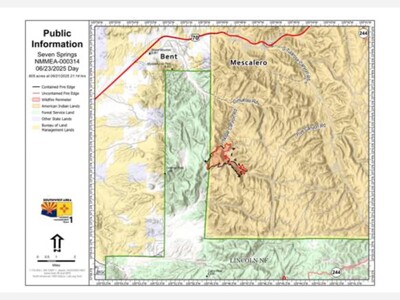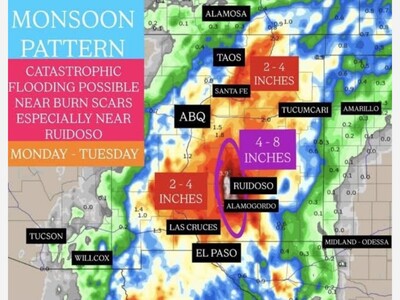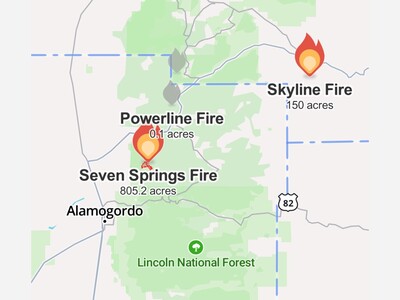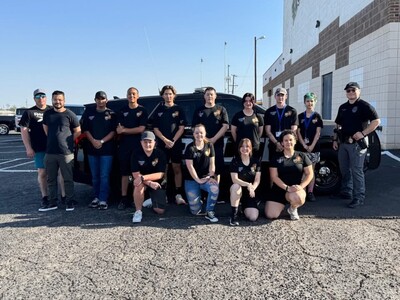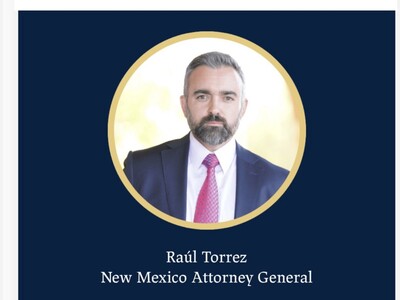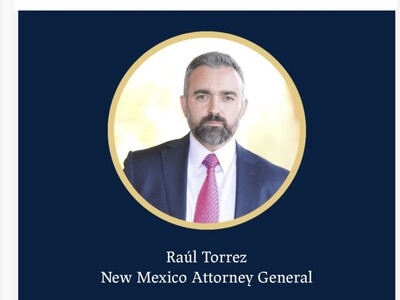Yeah, I have to agree with that donor to the Flickinger Center. I also donate to the Flickinger Center but unfortunately will have to stop doing so. It shouldn't be a location for people to spread hate. Doesn't matter if opposing voices will be there. This kind of thing is destroying America.
Radicalized N.M. Rep. Herrell cosponsors "We Will Not Comply Act" an attack on private business rights and funding of New Mexico Educational Institution
In partnership with radicalized Rep. Marjorie Taylor Greene, R-Ga. as a co-sponsor N.M. Representative Herrell introduced H.R. 2317, the "We Will Not Comply Act" in April. The bill stands little chance of passing with business interests questioning how the Republican party can turn on the rights of business to self-manage and self police.
Representative Herrell, a Republican, signed on as a co-sponsor of the bill last week, joining nine of her GOP House colleagues and demonstrated her feelings related to mask mandates and vaccinations this week by attending the Alamogordo School Board meeting and supporting those who don't want mask mandates.
The bill also restricts federal funds from being used to enforce vaccine requirements, and prevents public schools and higher education institutions from making the vaccinations a condition of attendance or participation in activities.
Individuals "who have been discriminated against" because of their vaccine status or for refusing to comply with a mask requirement are provided an avenue to seek damages in federal court under the bill's provisions.
the bill as drafted conflicts directly with and violates the Americans with Disabilities Act as well as state and federal laws guarding public health. The bill also is viewed as in conflict with Public Health Service Act, which authorizes the U.S. Health and Human Services Department to act against community spread of communicable diseases, such as Severe Acute Respiratory Syndrome (SARS) coronaviruses, including isolation and quarantine.
The Civil Rights Act offers protections based on race, gender, religion and national origin this proposed legislation is in conflict of that act as well.
There is precedent for vaccination laws dating to the 1905 U.S. Supreme Court ruling in Jacobson v. Massachusetts, which upheld compulsory vaccination laws.
Representative Herrell and Marjorie Taylor Greene have failed to do their homework related to legal precedent specific to public health laws. However there are followers to the cause as witnessed by the recent chaos at the Alamogordo School Board meeting.
It appears the radicalization of the cause will continue as Representative Herrell who has yet to hold a town hall meeting in Alamogordo is a speaker at and a leader in a gathering at the Flickinger Center Sunday August 8th. Congressional Representative Yvette Herrell, Minority House Leader Jim Townsend of Eddie County, Senator Gallegos of Lea County, Dr. Roger Black, Robert Aragon Esq. and Robert Moss Esq. representing the Floyd School District, Sara Smith of NM Freedoms Alliance will be onhand for a rally and an "educational and informational discussion." Organizers of this event claim, "This event will give you the tools you need to support and fight with (or against) our school board to represent the freedom of choice!"
A donor to the Flickinger Center who asked to remain anonymous for fear of retaliation by those recently radicalized mentioned to the Alamogordo Town News "her concern with a center for the arts that is a non-profit center of culture being used for this form of political propaganda." She went on to say that the Flickinger Center "was created for entertainment and culture not partisan political discussion and hosting events like the one about to take place is contrary to that mission and as such several donors are considering what they should do."
A lesson in history:
Freedom of speech and expression is a cornerstone of our constitutional freedoms as a free and safe society. Public health and dialog around public health has always been controversial.
In the early 1900's New Mexico County Sheriffs went door to door and forced vaccinations to those non-compliant to the flu epidemics of the time and small pox shot of which were not then FDA approved.
In 1901 a deadly smallpox epidemic tore through the Northeast, prompting the Boston and Cambridge boards of health to order the vaccination of all residents. But some refused to get the shot, claiming the vaccine order violated their personal liberties under the Constitution.
One of those holdouts, a Swedish-born pastor named Henning Jacobson, took his anti-vaccine crusade all the way to the U.S. Supreme Court. The nation's top justices issued a landmark 1905 ruling that legitimized the government’s authority to “reasonably” infringe upon personal freedoms during a public health crisis by issuing a fine to those who refused vaccination.
n 1901, the city of Boston registered 1,596 confirmed cases of smallpox, a highly contagious, fever-inducing illness infamous for causing a severe rash on the face and arms that often left survivors scarred for life. In Boston alone, 270 people died from smallpox during the extended 1901 to 1903 outbreak. That’s why public health officials in Boston and neighboring Cambridge issued their compulsory vaccination orders, hoping to reach the 90 percent vaccination rate required for herd immunity.
Jacobson, who served as the pastor of a Swedish Lutheran church in Cambridge, had been vaccinated against smallpox in Sweden when he was 6 years old, an experience that he later said caused him “great and extreme suffering.” So when Dr. E. Edwin Spencer, chairman of the Cambridge Board of Health, knocked on the Jacobsons’ door on March 15, 1902, the pastor refused vaccination for himself and his son.
A few months later, Cambridge was in a full-fledged smallpox “panic” with the city ordering the closure of all schools, public libraries and churches to stem the spread of the disease. Police officers accompanied health officials like Spencer, who went door to door vaccinating as many as 100 people a day.
But while the Cambridge vaccine order was compulsory, it wasn’t a “forced” vaccination. People like Jacobson who refused to get vaccinated faced a $5 fine, the equivalent of nearly $150 today. On July 17, 1902, Dr. Spencer issued a criminal complaint against Jacobson and other anti-vaccine activists to collect that $5 fine.
he broader battle over the validity of vaccination science reached a fever pitch during the smallpox outbreak. Anti-vaccination groups, citing alleged cases of death and deformity from bad reactions to smallpox vaccine, called compulsory vaccination “the greatest crime of the age,” claiming that it “slaughter[s] tens of thousands of innocent children.”
In response, newspaper editorials characterized the smallpox vaccination controversy as “a conflict between intelligence and ignorance, civilization and barbarism.” The New York Times dismissed anti-vaccine activists as “a familiar species of cranks” who were “deficient in the power to judge [science].”
It was against this heated backdrop that Jacobson fought his $5 fine, first in a state trial court and then by appeal in the Massachusetts Supreme Judicial Court. Jacobson wanted to present evidence that vaccines themselves were dangerous and ineffective, but the judges wouldn’t hear it. Instead, Jacobson’s chief argument became, “Compulsion to introduce disease into a healthy system is a violation of liberty,” specifically the personal liberty he believed was guaranteed by the U.S. and Massachusetts constitutions.
The highest court in Massachusetts also rejected Jacobson’s claims, siding instead with the authority of public health officials to determine the best methods for fighting an epidemic. Not ready to give up, Jacobson appealed his case to the U.S. Supreme Court in 1905, where he was accompanied by officers of the Massachusetts Anti-Compulsory Vaccination Association.
In the case known as Jacobson v. Massachusetts, Jacobson’s lawyers argued that the Cambridge vaccination order was a violation of their client’s 14th Amendment rights, which forbade the state from “depriv[ing] any person of life, liberty, or property, without due process of law.” At question, then, was whether the “right to refuse vaccination” was among those protected personal liberties.
The Supreme Court rejected Jacobson’s argument and dealt the anti-vaccination movement a stinging loss. Writing for the majority, Justice John Marshall Harlan acknowledged the fundamental importance of personal freedom, but also recognized that “the rights of the individual in respect of his liberty may at times, under the pressure of great dangers, be subjected to such restraint, to be enforced by reasonable regulations, as the safety of the general public may demand.”
This decision established what became known as the “reasonableness” test. The government had the authority to pass laws that restricted individual liberty, if those restrictions—including the punishment for violating them—were found by the Court to be a reasonable means for achieving a public good.
Source: University of New Mexico Archives, The History Channel, Congressional Register, US Supreme Court Registry, Operation Freedom Press E-mail, Anonymous Donor.
More News from Alamogordo
- Alamogordo County Commission, City of Alamogordo Joint Session Alamogordo County Commission, City of Alamogordo Joint Session
- Senate Parliamentarian Nixes Sale of Public Lands Including Otero County BLM Lands Senate attenpts to unload BLM lands


